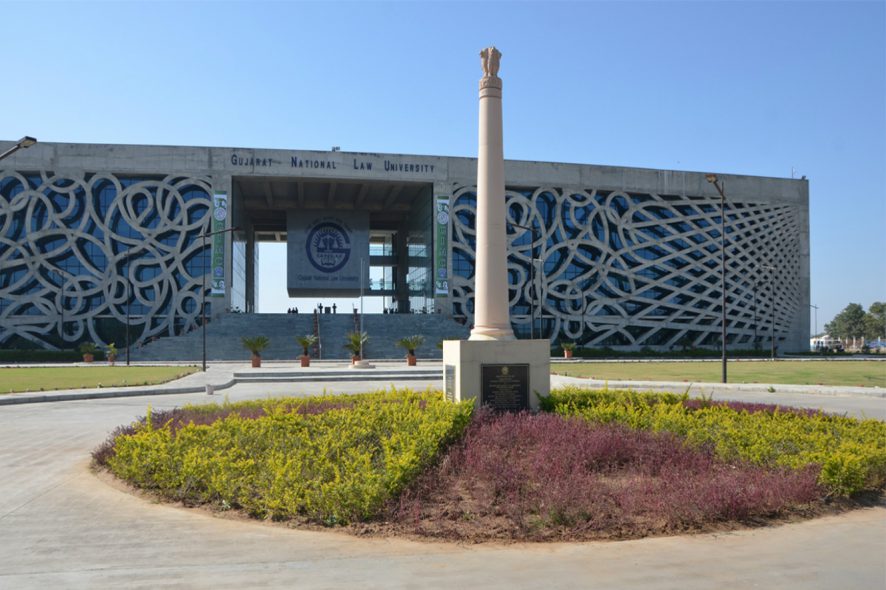The two-day International Conference on Banking & Finance 2018 took place at Gujarat National Law University, Gandhinagar on March 17 and March 18, 2018. The conference had Six Technical Sessions and hosted various eminent academics and industry professionals as resource persons. The conference was attended by around 150 participants (20 resource persons, 70 authors and 60 delegates).
Major themes of this conference were issues involving Global Banks, New International Regional and Multilateral Banks, BASEL Norms, Recognition of Non-Performing Assets (NPAs) in Indian Banks, Recapitalization of Indian PSU Banks, Restructuring and Consolidation in the Banking Sector, Reforms in the Banking System, International Opportunities for Indian Banks, Need for Legal Reforms in the Banking Sector, Global Financial Crisis, Global Financial Integration and Disintegration, Global Mergers and Acquisitions, Cyber Threats in International Financial System, Major International Financial Centres (IFCs), Global Competitiveness Indices and Green Financing.
The last day of the event was marked by the presence of Dr. Rajiv Kumar, Vice Chairperson, NITI Aayog, Shri Ashish Chauhan, MD & CEO, BSE and Dr. Bimal Patel (Director, GNLU). Dr. Rajiv Kumar discussed in detail, a) the current state of banking sector, b) various steps taken by the government for implementation of banking reforms, c) steps taken for formalisation and financial inclusion in the market and; d) the future way forward for the banking sector. With respect to the current state of the banking sector, he opined that it requires a deep and thorough analysis as to how we can improve risk assessing and risk clearing mechanism of the sector.
Highlighting on the point of banking reforms, he discussed on various targets set up by the govt. such as, availability of banking services within 5 km of every village, a mobile app for locating banking outlets, along with which major recapitalisation scheme as adopted by the govt. He further supported the implementation of the Nayak Committee report. For the purpose of formalisation in the market, he highlighted upon demonetisation, implementation of the Goods and Services Tax, Insolvency and Bankruptcy Code, Jan Dhan Yojana and Mudra Scheme. Further talking about the way forward for the sector, he supported the move of digitalisation and advised GPS tag on secured assets, restructuring of PSBs for the purpose of consolidation and need for more specialised banks.
Shri Ashish Chauhan discussed on how finance is not appreciated and is considered as a subsidiary activity even though it is like the blood that gives oxygen to every cell and the same way finance contributes to the economy of not only the nation but also the whole world. He focused on the two frameworks of Financing, i.e. the Market and the Concept of Banking. He said that both are important legs and need to be equally strong for the rise of the economy. He condemned the financial market for not accepting the need of reforms. He said that the lack of reforms have led to a crisis, which now needs to be resolved and looked with a larger perspective. He focused on the need to raise funds through markets and take decisions with the perspective of near future. He laid emphasis on the need to have a tertiary market that will build a strong nexus for a Secondary market, making the Primary market strong. He wants the households from the middle-income group to invest in these tertiary markets as a risk-free instrument. This will also reduce the trade revenue system cost. He wants India not to be a follower and improve the capital formation with the help of modern technologies and modern change in the markets. He focuses on the non-linear economy where it will need little capital investment and great returns and growth in the economy. He said that the next 40 years will create such wealth through market that has not been created in the past 1000 years. He also said that if a proper structure and system is created for banking system, there will be no need for too much reliance on outside capital. For a stronger capital formation from the market side, he focused on giving confidence to the householders to confirm that their money will be returned and managed with all regulations. Lastly, he praised GIFT City and said that it will play a role for India that Hong Kong has played for China and it will give a huge growth to India in the next 10-20 years and raise a wealth of $10 trillion.







